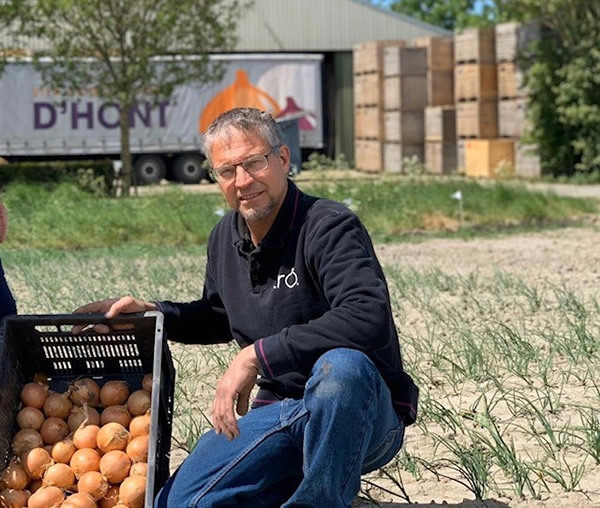"There are enormous differences between plots, within our company, too," begins Jaap D'Hont of the Dutch grading company with the same name. "We get onions from plots with yields of 15 tons per hectare, but also 50 tons. That difference depends purely on being able to irrigate or not. I doubt onion cultivation will be possible in Zeeland in the coming years, without having water available."
 Jaap D'Hont
Jaap D'Hont
Jaap tried to grow seed onions on an unirrigated plot again this year but to no avail. "After five unusual years, I'd hoped for one year of good luck and took the chance. But I, again, concluded that it's too risky, especially with seed onions. Onion sets are slightly stronger and get an extra shower in the spring, but with seed onions, the risk of not watering is too great," he says.
More regional growers are settling for less. "In recent years the onion acreage here has been shrinking by 15-20% annually and this year will be no different." As a Dutch and Belgian supermarket supplier, Jaap has stable sales, but getting the required volumes is becoming increasingly challenging. "That's why I haven't reduced my onion crops. We grow onions for supermarkets, supplemented by onions we buy from other regional customers. Also, in Belgium, but, there, they face the same problems. In West Flanders this year's quality isn't good either," he explains.
That does not mean Jaap is pessimistic about the future. "Onion cultivation will just look different. Drip irrigation, for example, offers good opportunities for extra watering. It's better to make a good bet on five hectares of that than to grow on 25 hectares, where too many plots fail. However, that needs to be researched and developed properly. There are still quite a few snags. You can grow on beds or flat ground. For those that remain, I thus foresee a healthy future. Onion cultivation won't disappear here; it will just happen differently and perhaps on a smaller scale."
D'Hont's shallot crop did not do well this year, either despite Jaap being able to irrigate that. "We lost half of it because of bean seed flies. We were, thus, left with too-large shallots and insufficient volumes. I don't know if I'll keep growing shallots. It's a difficult, expensive crop," he admits.
This year's red onion market outlook seems favorable, though. "There were very few red onion sets with fairly good quality. Now there are too few red seed onions for export, so this could be a great year price-wise. There's a worldwide shortage, and in the Netherlands, acreage has also shrunk considerably. Plus, there aren't many large red onions."
"Climate change means there are developments regarding varieties, too. People are, for instance, increasingly trying to bring in Spanish blood, but I don't think those results are quite the answer yet in terms of growth and quality. Also, breeders are working hard on fusarium-tolerant varieties, but that always seems to take too long for growers," Jaap, who is also exploring optical grading, says. "That will change the grading market quite a bit in the next ten years. I expect most companies will have a machine up and running by then, which is why the whole onion sector is looking around," he concludes.

Sorteerbedrijf D'Hont BV
Noordweg 1
4503 PE Groede
Tel: 0117-371606
Mob: 06-28942936
info@sorteerbedrijfdhont.nl
